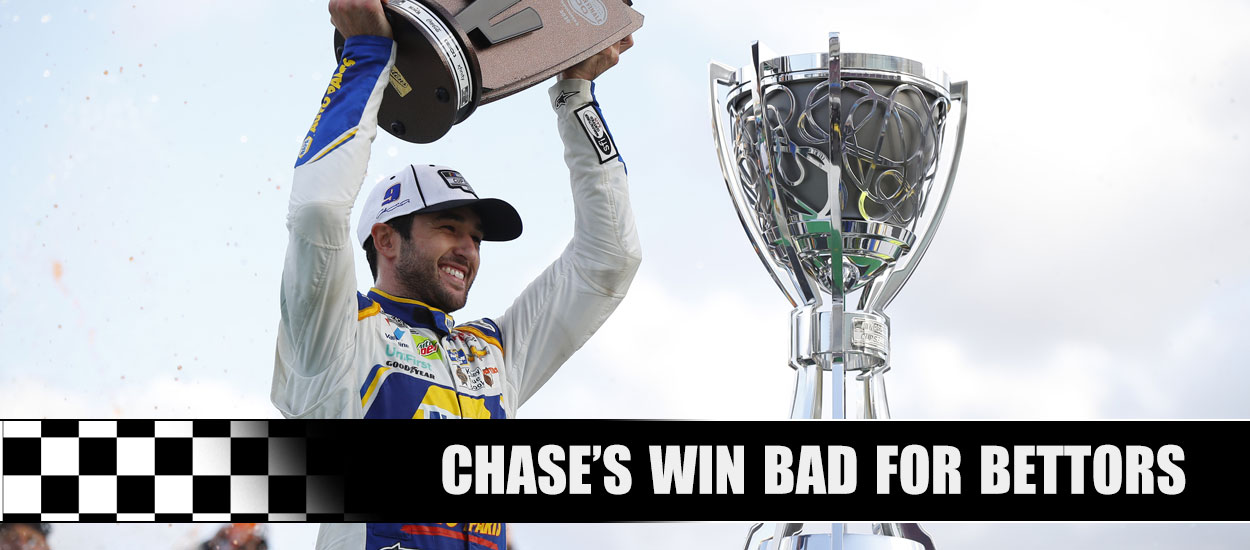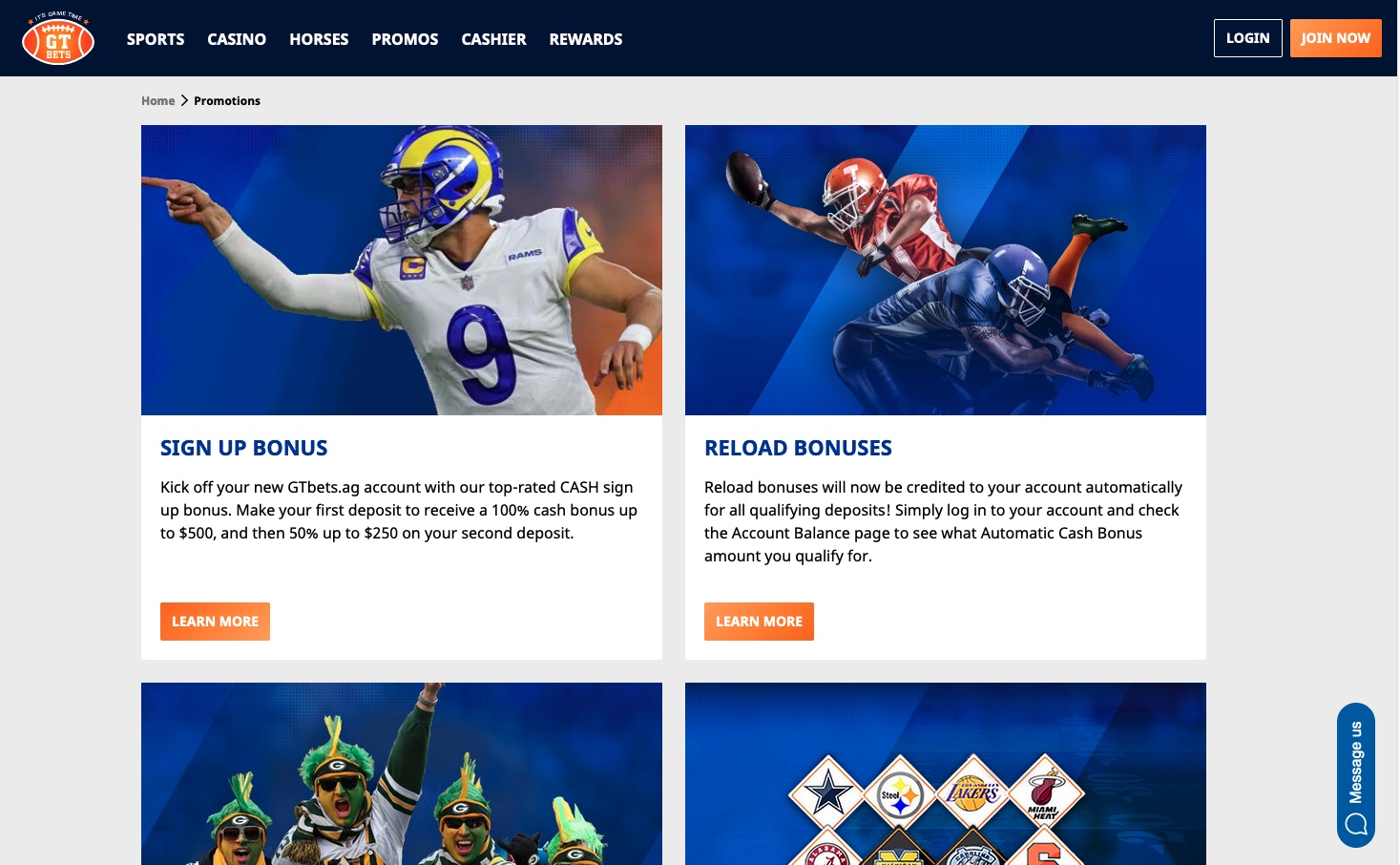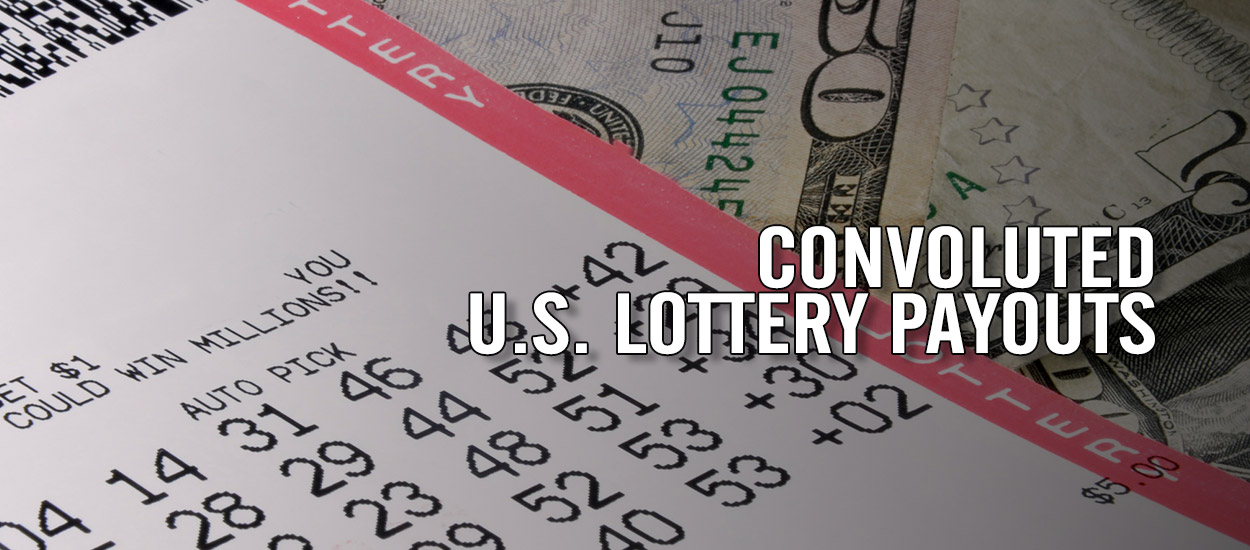A NASCAR DQ has bettors and sportsbooks wondering, "What is fair?"
The NASCAR betting world was up in arms on Sunday night, several hours after the running of the NASCAR Cup Series Race at Pocono Raceway, the M&M’s Fan Appreciation 400. The race concluded around 5:30 pm ET with Denny Hamlin beating Kyle Busch and Chase Elliott to the checkered flag. ![]() Hamlin was paid out by all sportsbooks as the winner. Several hours later, NASCAR announced that Hamlin and Busch were disqualified after a post-race inspection discovered an anomaly, which led to Chase Elliott being declared the winner.
Hamlin was paid out by all sportsbooks as the winner. Several hours later, NASCAR announced that Hamlin and Busch were disqualified after a post-race inspection discovered an anomaly, which led to Chase Elliott being declared the winner.
Joe Gibbs Racing (JGR) competition director explained what happened on Monday, the day after the race on Nascar.com:
"In our review of the post-race infractions on the 11 and 18 cars at Pocono, it was discovered that a single piece of clear tape was positioned over each of the lower corners of the front fascia ahead of the left-front and right-front wheel openings on both those cars. The added pieces were 2 inches wide and 5 ½ inches long with a thickness of 0.012 inches and installed under the wrap. This change in our build process was not properly vetted within our organization and we recognize it is against NASCAR’s rules. We apologize to everyone for this mistake, and we have made changes to our processes to ensure that it does not happen again."
Almost everyone agreed that the extra piece of tape likely wouldn't have changed the result, but rules are rules, so JGR just accepted the results. When asked if he was excited about inheriting the win, Chase Elliott said he was on an airplane when it was announced and he didn't really care since he didn't feel he raced well and didn't believe he actually won the race.
While JGR and Elliott were nonchalant about the outcome, many bettors were outraged.
Two betting companies operating in North America, BetCaesars and Bet365 paid Chase Elliott as the winner, while every other company paid Denny Hamlin as the winner. Bet365 actually paid Hamlin bettors their winnings, but then regraded the bets later, resulting in many bettors having negative balances in their accounts had they wagered the winnings on something else. It is unclear if BetCaesars ever paid Hamlin bettors when the race was over or if they regraded the bets if they did. I reached out to a couple of players I know who wager at BetCaesars, but they said they didn't bet on the race. I emailed a representative at Bet365 to ask why they regraded the bet and they simply pointed me to rule 4.5 on their rules and regulations:
"4.5 Winnings from settled bets/wagers are added to the balance of your betting account. Any funds/winnings credited to an account in error are not available for use, and bet365 reserves the right to void any transactions involving such funds and/or withdraw the relevant amount from your account and/or reverse the transaction, either at the time or retrospectively."
When questioned further about the reasoning for the decision, again they simply pointed me to rule on their website under NASCAR outright betting:
"The official Nascar winner of the race shall be the winner of the race for wagering purposes (this includes all races which were halted prematurely for any reason."
I mentioned to the representative that I felt this rule is inconsistent with their F1 rules which state that the results are official once the drivers stand on the podium. The response I got was simply that different sports have different rules. In better words, ‘we have the right to be create any rules we want as long as it's in writing.’ In fairness to Bet365, the majority of their betting rules say that the results are graded per the official results of the governing body, although they have made exceptions in the past in unusual situations.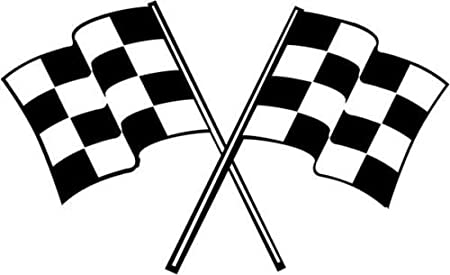 A representative at Pointsbet provided me the reasoning for grading Denny Hamlin as the winner, which appears to be similar to the reasoning of BetMGM, BetRivers, FanDuel and BallyBet, along with almost all other U.S. facing sportsbooks including those offshore.
A representative at Pointsbet provided me the reasoning for grading Denny Hamlin as the winner, which appears to be similar to the reasoning of BetMGM, BetRivers, FanDuel and BallyBet, along with almost all other U.S. facing sportsbooks including those offshore.
"Please be advised that the settlement for Denny Hamlin to win the race will stand and the ones for Chase Elliot will be disregarded in line with our House Rule under "General Motorsports Rules": All race bets are settled on the official race organizers classification at the time of the podium presentation, with subsequent disqualifications disregarded." You may also check out the House Rules via this link.
This is a rule from F1, since NASCAR doesn't have a podium, but most sports betting companies just list all rules under Motorsports, without differentiating the series. For NASCAR it probably should say "at the time of presentation in the winner’s circle", rather than the podium.
DraftKings apparently paid both drivers as the winner, although a source tells me they will write into their rules something similar to Pointsbet so there will be no confusion going forward that the result after the race is finished will be the results for betting purposes.
This was a rare event, since no driver has had a win taken away from them in 60 years. Drivers have failed post-race inspections previously, but it only resulted in loss of points. Most recently, in 2017 Joey Logano lost his points, but kept the win. But, in 2019 NASCAR changed the rules so that drivers would lose the win as well as points for a team miscue, likely because the new scoring system guarantees a driver a spot in the chase (playoffs) if they score a win.
A bettor I spoke to who lost his bet on Hamlin was furious for that specific reason.
"When teams are disqualified they lose owner points and sometimes drivers lose points too, but the win is never taken away. This has been the standard as long as I’ve been betting. How is it fair for that to change that now? Hamlin won the race on the track and he should be paid as the winner."
Again, this was a very rare situation and most top sportsbooks go out of their way to keep bettors happy, knowing it will likely be a one-off in exchange for building some goodwill. A prime example of that was at the 2021 Memorial golf tournament when John Rahm had a 6 shot lead going into the last day of the tournament but had to withdraw when he was told he tested positive for COVID-19, even though he had no symptoms. Several books, including William Hill and BetCaesars, paid John Rahm as a winning bet anyway, realizing it was an anomaly and it was very unlikely he would have lost the tournament had he continued. Many other books, including BetMGM, DraftKings, FanDuel and Pointsbet followed suit, calling it a good will gesture although it was clearly a means to try and gain some loyalty with bettors who wagered on Rahm, while Westgate, Bet365 and a few others stuck to their rules and paid only Cantlay as the winner. Some offshore books refunded bets on Rahm but did not grade him as a winner. It's clear that more established books didn’t want to set a precedent and weren’t prepared to give away free money to a golfer who, without question, lost the tournament, since he didn't complete all 72 holes.
What is . . . Fair?
This incident begs three questions. Is it fair for bettors to lose their wagers for disqualifications after the event has finished? Is it right to take away winning and regrade bets that are already paid out. And most importantly, how long is reasonable for this regrading to be occur?
The general rule in sports in North America has always been that bets stand at the conclusion of the event and subsequent administrative decisions are not counted for betting purposes. This also includes appeals. While it is rare for a sport to change the result due to an appeal, it does happen on occasion.
For U.S. bettors, time matters
How long should a book keep a bet open if there is an appeal?
It was noted that JGR could appeal the decision to disqualify Hamlin and Busch, but they chose not to. If they did appeal, however, are bettors supposed to wait several weeks to find out if they won a bet? What if the appeal is is several weeks or even months long? Is it fair to the sportsbook to keep that bet open that long? Bettors on Presidential elections know the agonizing process of waiting for recounts in close races. Some George W. Bush bettors waited months to have their bets paid when Al Gore challenged the results in Florida. Imagine if that was a regular occurrence!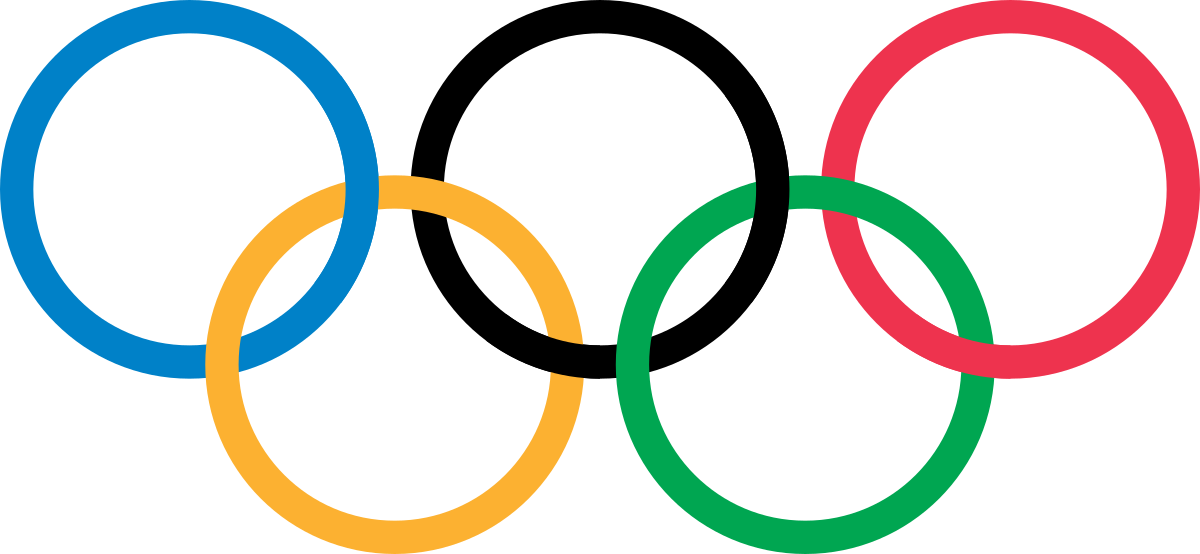 A prime example where subsequent decisions are never counted is the Olympics. Several athletes won medals and subsequently had the medals taken away from them after failing a drug test. But, I can find no occurrence were the bet was regraded and the new gold medalist paid out, while bettors on the original gold medalist was declared the loser for betting purposes. In the 2008 summer Olympics, for example, the heavily favored Jamaican team won the 4x100 meter relay, but days later the team had it stripped when Nesta Carter tested positive for steroids in a second sample. Bettors on Jamaica kept their winnings, while bettors on Trinidad and Tobago, who inherited the gold medal, were not paid out.
A prime example where subsequent decisions are never counted is the Olympics. Several athletes won medals and subsequently had the medals taken away from them after failing a drug test. But, I can find no occurrence were the bet was regraded and the new gold medalist paid out, while bettors on the original gold medalist was declared the loser for betting purposes. In the 2008 summer Olympics, for example, the heavily favored Jamaican team won the 4x100 meter relay, but days later the team had it stripped when Nesta Carter tested positive for steroids in a second sample. Bettors on Jamaica kept their winnings, while bettors on Trinidad and Tobago, who inherited the gold medal, were not paid out.
And what about horse racing? Medina Spirit won the Kentucky Derby in May of 2021, but was stripped of that win almost a year later. Are books supposed to regrade the race, take money from those who bet on Medina Spirit and pay as a winner anyone who bet on Mandaloun? Of course, they aren’t, because if books were held to that rule, it would be a logistical nightmare. So, every book has made it clear that the results after the race is “declared official” is the result and no adjustments are made. Ironically, Bet365 was the first sportsbook to offer a promotion in horse racing where the winner at the conclusion of a race is automatically paid out. That rule was instilled almost a decade ago (long before the reversal of PASPA) whereby the horse who crosses the line first is paid out immediately. If a steward’s inquiry disqualifies the horse, then the new winner is paid out as well. When announcing that new rule on their website, Bet365 said that the race should be decided on the track and bettors shouldn’t lose a bet due to the subjective decision of a judge who reviews a replay of the race.
But it’s not just in individual sports where this happens. There are team sports where the whole team is disqualified due to the actions of one player or coach, and it often is announced after the season is over.
I spoke to a sportsbook director of an offshore sportsbook who moved from a major company in England to an offshore book in the Caribbean, and he said that he knew right away that he had to change some rules to keep American bettors happy.
"When I first came to the Caribbean, I asked that all our rules be changed to those at (my first company). But I soon learned that American and UK bettors were different. While bettors in Europe are used to rules that often forced them to wait for results, Americans wanted a decision fast. So, I had to change some rules to say that the bet at the conclusion of the game is the result. If a team wins a game, a driver wins a race or a player wins a tournament they expect the money in their account immediately and they don’t complain if that is later altered due to a judge’s decision that discovers a technicality later. And in hindsight, it’s the way it should be."
So, the race at Pocono indeed created frustration. Bettors on Denny Hamlin who lost their bets at sportsbooks who paid out on the official results were upset and bettors on Chase Elliott who lost their bets at sportsbooks who would not regrade a bet on the official results were upset. Only DraftKings bettors were left satisfied. This event was an anomaly, but there is no reason to believe it will never happen again and with so many sports being offered each day, it almost certainly will happen with some sport, at some time. And almost everyone would agree that having a set of rules that applies to all books is best so everyone knows where they stand whether they play at Bet365, BetMGM or even BetOnline.
What do you think? It would be interesting to find out from sports bettors whether they believe bets should be paid right away or whether books should wait for the official results. And if it’s the latter, what is a reasonable time to wait? Please email hartley@osga.com or reach out via Twitter @HartOSGA with any comments for a follow-up article, as this will almost certainly be a topic of discussion for some time as sports betting grows throughout North America.
Read insights from Hartley Henderson every week here at OSGA and check out Hartley's RUMOR MILL!










